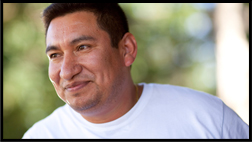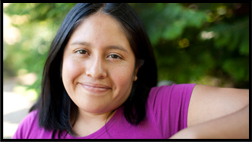

Jacob
from Siberia, Russia
Jake is from Siberia, Russia. His parents, both engineers, decided to move to the United States because of an intensely anti-Semitic climate. They arrived to the US long on hope and short on everything else, particularly as all of the family's belongings were confiscated by the Russian government. Further, without the ability to speak English, Boris could only find work as a truck driver and Eugenia, a house cleaner.
Learning how to adapt to a new culture, Jake graduated from high school and attended Rutgers University. It was there that he struggled with his identity. Was he Russian? Did he belong back in Russia? Or was he American? He decided that enlisting in the Army Reserves would help him decide. Jake graduated and found work as a structural engineer. Then, a year later, Jake was called up to serve in Iraq.
When he returned from his tour of duty, Jake discovered that his engineering position had been eliminated. He sent out hundreds of resumes – to no avail. Jobless, but for the first time in his life feeling "100% American," Jake heard about a new class of permits for fruit and vegetable vendors in New York. Having long wanted to start his own business, Jake opened an organic fruit and vegetable cart on Staten Island. "It's gonna be a gold-mine," he says.

Bardo
from Guerrero, Mexico
Bardo, from Guerrero, Mexico, walked through the desert to the United States when he was just 15 years old, encouraged by his mother to "be somebody." Upon his arrival, Bardo started working 24/7 in a variety of jobs – construction, stocking supermarket shelves, you name it. After a few years, he managed to save a remarkable amount of money – $50,000 dollars – which he used to start his own business: importing fruits and vegetables from Mexico. However, Bardo learned the hard way that starting a produce business is not easy – his entire shipment of produce spoiled because of poor refrigeration coming by train from Mexico. All of his savings gone, Bardo had to start over again. So he and his wife decided to open up a fruit and vegetable stand, and he has seen his business grow exponentially. His customers come from all corners of New York – particularly because he has a wide offering of Mexican vegetables, cacti, and other exotic items. Bardo is expanding his business – and is currently sourcing organic produce from a farmer in New Jersey. Bardo is intent on seeing his children become educated and go to college. "I don't want them to work like I do… in the street," he says.

Gloria
from Ecuador
Gloria is the daughter of two street vendors from her home country of Ecuador. Finding it nearly impossible to make a living and provide for her family in the poor economic conditions ravaging Ecuador, Gloria made the agonizing decision to leave her infant son and daughter behind and move to the United States. Once here, Gloria worked tirelessly as a seamstress, sending every dollar she made home to her children. Four years later, she had saved enough money to be able to bring her young family to New York. Gloria, like Bardo, is remarkably entrepreneurial. As a fruit and vegetable vendor, she recently organized a women's cooperative with other neighboring street vendors in the hopes of driving down wholesaler prices. And notwithstanding the friction that can sometimes occur between street vendors and store owners, Gloria is well-liked in the neighborhood, where nearby storeowners often purchase fruits and vegetables from her. Gloria is determined to open a store front with healthy foods for cancer patients and other ill Americans.

Shaheen
from Bangladesh
Shaheen is a Badminton-enthusiast from Bangladesh. He reluctantly agreed to come to the United States, at the urging of his father, so that he could help support his many brothers. With a one-way ticket and only $200 dollars in his pocket, Shaheen arrived in New York. Like Bardo, Shaheen worked non-stop at small jobs, saving up approximately $80,000. He, too, decided to start his own business, and opened a corner store in the Bronx. However, Shaheen soon realized that he was not prepared to run his own business. He did not understand the language of the lease agreement or how to manage inventory. He ran out of money and lost his business. Like Bardo, Shaheen found himself jobless, his savings completely depleted. He, too, would have to start over, this time finding an opportunity as a street cart vendor. Shaheen is now the leader of a team of ten Green Cart vendors, enforcing rules for uniform and hygiene among his team members and turning out profits as a result. Shaheen dreams of expanding his business to employ 20 more people on his team. "That will support over 200 families," he says. "I can help a lot of people." Shaheen also insists that his children can be whatever they wish – "doctor, fine. Anything but a lawyer."

Sarahi
from Puebla, Mexico
Sarahi, from Puebla, Mexico, started working in the corn fields alongside her parents at the age of 8. When she turned 15, Sarahi's father insisted that she find work in the US to better help support the family. However, the voyage was fraught with danger, especially for a 15 year old girl. While crossing the border, Sarahi found herself tangled in the fence separating Mexico from the US where she was attacked by the "coyotes" who were supposed to guide her to safety. Sarahi was able to free herself and arrived in the US, deeply in debt to the coyotes, at which point she began working as a cleaning woman for $4 dollars an hour. Sarahi has had a life-long dream of "being my own businesswoman" and has found stability as a Green Cart vendor. She runs this small business with her husband and maintains a positive attitude and a sense of purpose.